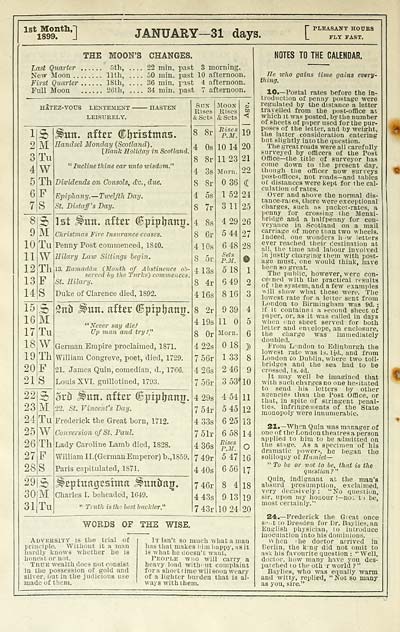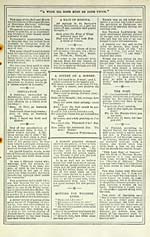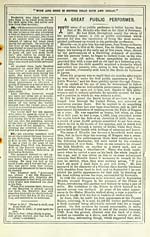Towns > Dalkeith > 1899, 1902 - Carment's directory for Dalkeith and district and year book > 1899
(134)
Download files
Complete book:
Individual page:
Thumbnail gallery: Grid view | List view

1st Month,"
JANUARY— 31 days.
PLEASANT HOUES
FLY FAST.
THE MOON'S CHANGES.
JLast Quarter 5th,
Ne\T Moon lltli,
First Quarter ISth,
Full Moon 2t5tl],
22 min. past 3 morning.
50 rain, past 10 afternoon.
36 min. past 4 afternoon.
34 min. past 7 afternoon.
WORDS OF THE WISE.
Adversity is the trial of
in-iiu-iple. Without it a man
hardly knows whether he is
honest or not.
Truk wealth does not consist
in the possession of ^old and
silver, but In the judicious use
made of them.
It isn't so much what a man
has that makes liimliappy, asit
Is what he doesn't want.
People who will carry a
heavy load without complaint
for a short rime will soon weary
of a lighter burden that is al-
ways with i hem.
NOTES TO THE CALENDAR.
Tie ivlio gains time gains every-
thing.
10.— Postal rates before the in-
troduction of penny postage were
regulated by the distance a letter
travelled from the post-offlce at
which It was posted, by the number
of sheets of paper used for the pur-
poses of the letter, and by weight,
the latter consideration entering
but slightly into the question.
The great roads were all carefully
surveyed by officers of the Post
Office— the title of surveyor has
come down to the present day,
though the officer now surveys
post-offices, not roads— and tables
of distances were kept for the cal-
culation of rates.
Over and above the normal dis-
tance-raies, there were exceptional
charges, such as packet-rates, a
penny for crossing the Menai-
bridge and a halfpenny for con-
veyance In Scotland on a mail
carriage of more tlian two wheels.
Indeed, one wonders lv>\v letters
ever reached their destination at
all, the time and labour involved
m justly charging them with post-
age must, one would think, luive
been so great.
The public, however, were con-
cerned with tlie practical results
of I he system, and a few examples
\\ill show what these were. The
lowest rate for a letter sent from
London to Birmingham was 9d. ;
if it containe I a second sheet of
paper, or, as it was called in days
when one sheet served for both
letter and envelope, an enclosure,
the charge was immediately
doubled.
From London to Edinburgh the
lowest rate was is. lid., smd from
London co Dublin, where two toll-
bridges and the sea had to be
crossed. Is. 4d.
It may well be imagined that
with such charges no one hesitated
to send his letters by other
agencies than the Post Office, or
that, in spite of stringent penal-
ties, infringements of the State
monopoly were innumerable.
21.— "When Quin was manager of
one of the London theatres a person
applied to him to be admitted on
the stage. As a specimen of his
dramatic power.^, he began the
soliloquy of Hamlet—
" To be or vot to be, that is the
question?"
Quin, indignant at the man's
absurd presumption, exclaimed,
very decisively: "No question,
sir, upon my houour !— not 1 1 be,
most certainly."
24.— Frederick the Gieat once
Sf'.t to Dresden for Dr. Baylies, an
English physician, to introduce
inoculation into his dominions.
u hen I he doctor arrived in
Berlin, the kmg did not omit to
ask his favourite question : " Well,
doctor, how many have you des-
patched to the oth r world ?"
Baylies, who was equally warm
and witty, replied, "Not so many
as you, sire."
JANUARY— 31 days.
PLEASANT HOUES
FLY FAST.
THE MOON'S CHANGES.
JLast Quarter 5th,
Ne\T Moon lltli,
First Quarter ISth,
Full Moon 2t5tl],
22 min. past 3 morning.
50 rain, past 10 afternoon.
36 min. past 4 afternoon.
34 min. past 7 afternoon.
WORDS OF THE WISE.
Adversity is the trial of
in-iiu-iple. Without it a man
hardly knows whether he is
honest or not.
Truk wealth does not consist
in the possession of ^old and
silver, but In the judicious use
made of them.
It isn't so much what a man
has that makes liimliappy, asit
Is what he doesn't want.
People who will carry a
heavy load without complaint
for a short rime will soon weary
of a lighter burden that is al-
ways with i hem.
NOTES TO THE CALENDAR.
Tie ivlio gains time gains every-
thing.
10.— Postal rates before the in-
troduction of penny postage were
regulated by the distance a letter
travelled from the post-offlce at
which It was posted, by the number
of sheets of paper used for the pur-
poses of the letter, and by weight,
the latter consideration entering
but slightly into the question.
The great roads were all carefully
surveyed by officers of the Post
Office— the title of surveyor has
come down to the present day,
though the officer now surveys
post-offices, not roads— and tables
of distances were kept for the cal-
culation of rates.
Over and above the normal dis-
tance-raies, there were exceptional
charges, such as packet-rates, a
penny for crossing the Menai-
bridge and a halfpenny for con-
veyance In Scotland on a mail
carriage of more tlian two wheels.
Indeed, one wonders lv>\v letters
ever reached their destination at
all, the time and labour involved
m justly charging them with post-
age must, one would think, luive
been so great.
The public, however, were con-
cerned with tlie practical results
of I he system, and a few examples
\\ill show what these were. The
lowest rate for a letter sent from
London to Birmingham was 9d. ;
if it containe I a second sheet of
paper, or, as it was called in days
when one sheet served for both
letter and envelope, an enclosure,
the charge was immediately
doubled.
From London to Edinburgh the
lowest rate was is. lid., smd from
London co Dublin, where two toll-
bridges and the sea had to be
crossed. Is. 4d.
It may well be imagined that
with such charges no one hesitated
to send his letters by other
agencies than the Post Office, or
that, in spite of stringent penal-
ties, infringements of the State
monopoly were innumerable.
21.— "When Quin was manager of
one of the London theatres a person
applied to him to be admitted on
the stage. As a specimen of his
dramatic power.^, he began the
soliloquy of Hamlet—
" To be or vot to be, that is the
question?"
Quin, indignant at the man's
absurd presumption, exclaimed,
very decisively: "No question,
sir, upon my houour !— not 1 1 be,
most certainly."
24.— Frederick the Gieat once
Sf'.t to Dresden for Dr. Baylies, an
English physician, to introduce
inoculation into his dominions.
u hen I he doctor arrived in
Berlin, the kmg did not omit to
ask his favourite question : " Well,
doctor, how many have you des-
patched to the oth r world ?"
Baylies, who was equally warm
and witty, replied, "Not so many
as you, sire."
Set display mode to: Large image | Transcription
Images and transcriptions on this page, including medium image downloads, may be used under the Creative Commons Attribution 4.0 International Licence unless otherwise stated. ![]()
| Scottish Post Office Directories > Towns > Dalkeith > Carment's directory for Dalkeith and district and year book > 1899 > (134) |
|---|
| Permanent URL | https://digital.nls.uk/86551244 |
|---|
| Description | Annual. Published 1899-1902. Preceded by: Carment's ... directory for Dalkeith and district. |
|---|---|
| Shelfmark | 5.1429 |
| Additional NLS resources: |
| Description | Directories of individual Scottish towns and their suburbs. |
|---|
| Description | Around 700 Scottish directories published annually by the Post Office or private publishers between 1773 and 1911. Most of Scotland covered, with a focus on Edinburgh, Glasgow, Dundee and Aberdeen. Most volumes include a general directory (A-Z by surname), street directory (A-Z by street) and trade directory (A-Z by trade). |
|---|


